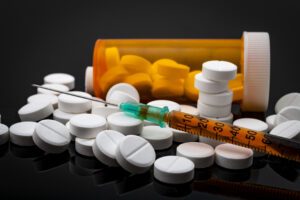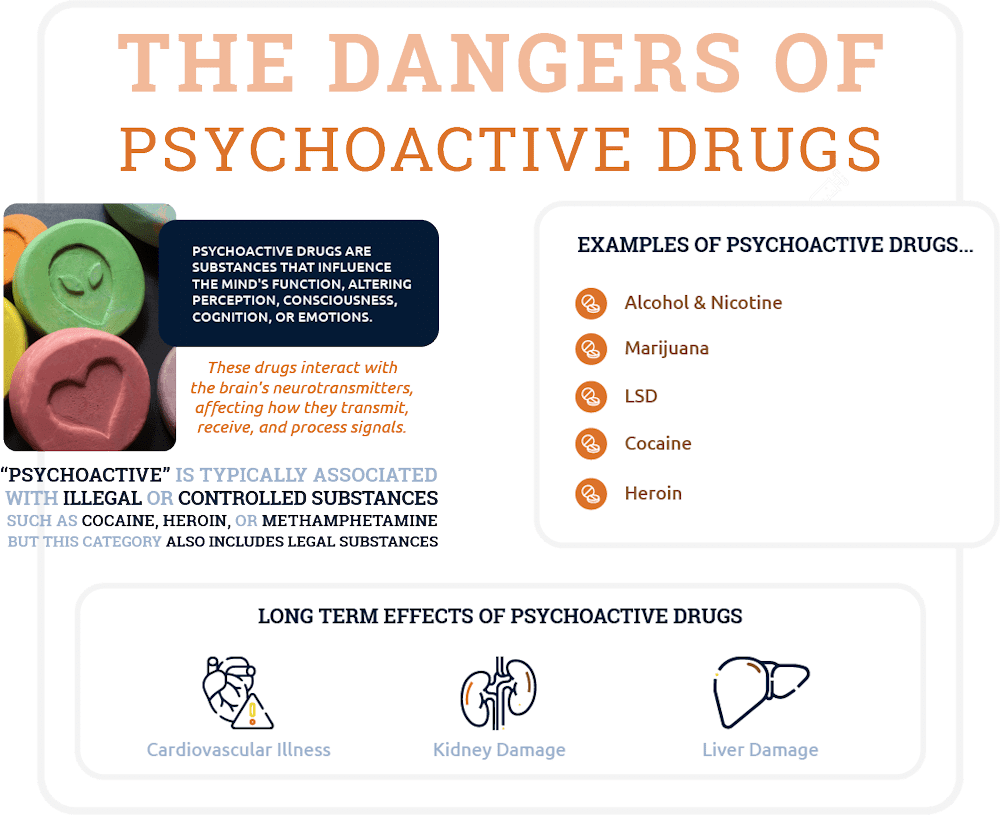Psychoactive drugs are part of our lives, whether we like it or not. Most drugs exist for a positive purpose — to relieve pain, clear up an infection, and address the effects of illness. Some psychoactive drugs exist in the things we eat or drink, such as caffeine. Other psychoactive drugs lead to devastating problems with addiction.
Psychoactive drugs cover a wide set of categories, including depressants, stimulants, and hallucinogens. They have varying levels of dangers — some of which may require professional treatment from a drug rehab Illinois such as Northern Illinois Recovery Center.
Jump to Section
What are Psychoactive Drugs?

Psychoactive drugs are substances that influence the mind’s function, altering perception, consciousness, cognition, or emotions. These drugs interact with the brain’s neurotransmitters, affecting how they transmit, receive, and process signals. Examples include alcohol, nicotine, and various medications and illicit substances.
Many people associate “psychoactive” with illegal or controlled substances, such as cocaine, heroin, or methamphetamine. But this category also includes legal substances such as alcohol or nicotine.
A compound doesn’t necessarily have to be addicting to be considered psychoactive. All it needs to do is act on the brain and transform how you think, behave, or perceive the world around you.
Some drugs pose more dangers than others. The different types of psychoactive drug categories include:
- Stimulants, including caffeine, speed, ice, and ecstasy
- Depressants, including alcohol, marijuana, and benzodiazepines
- Hallucinogens, including LSD and mushrooms
The strongest and most dangerous psychoactive drugs are the ones that typically require the intervention of professional help when they lead to dependence or drug addiction. If this describes your or someone you love, seek professional help.
Dangers of Psychoactive Drugs


All drugs prompt a reaction within your body. Some of those reactions are positive and expected; others cause significant and long-lasting difficulties. Psychoactive effects refer to the changes in mental processes that result from substances like drugs, alcohol, or nicotine. These effects can alter perception, consciousness, cognition, mood, and emotions, impacting how an individual thinks, feels, and experiences their environment. Some of the dangers of psychoactive drugs include:
- Short-term physical effects include higher blood pressure, rapid heartbeat, problems with sleeping and eating, nausea and vomiting, shakiness, or dizziness.
- Long-term effects such as cardiovascular illness, respiratory difficulties, kidney or liver damage
- Physical dependence, which involves a shift of brain chemistry, leading to poor judgment and uncharacteristic risk-taking, as well as financial problems
- Cognitive difficulties in terms of the ability to think clearly and make informed decisions.
The most severe effects are tied to more dangerous drugs such as cocaine or heroin, or even a legal drug such as alcohol. But even psychoactive drugs that are widely found in foods, such as caffeine, can also cause problems with dependence.
How Treatment Works
Psychoactive drugs that lead to addiction are a difficult problem to address. In most instances, it’s not safe to end addiction alone. You need the help and support of medical and counseling professionals. But how does the addiction treatment programs in Illinois work?
Rehab begins with an intake assessment, where doctors and therapists establish a baseline for your health. Based on the outcome of that assessment, you will be presented with a thorough treatment plan to guide you to recovery.
The first stage of treatment is detox. You must step down from your use of psychoactive drugs to have the best chance at recovery.
Following detox, you will spend time in counseling. Working with trained addiction therapists, both individually and in groups, you will understand your circumstances and build positive coping skills for the future.
Finally, in the aftercare phase, you will be provided with resources, such as additional counseling, to reduce the risk of relapse.
Break the Dependence at Northern Illinois Recovery Center
Psychoactive drugs are dangerous to our health, our finances, our family, and our stability. If you have been caught in the cycle of dependence, don’t try to step down alone. Seek support from Northern Illinois Recovery Center. We’re an outpatient treatment center near Chicago that provides treatment for substance abuse, process addictions, and co-occurring disorders. We will work with you according to your concerns to build a treatment plan that works. You will be able to recover in a facility that is safe, secure, and comfortable. Don’t wait another day to get started on your recovery. Call Northern Illinois Recovery Center today at 855.786.1978 for more information or to schedule a consultation.


Licensed Physician and Surgeon
Dr. Beth Dunlap, a board-certified addiction medicine and family medicine physician, and is the medical director at Northern Illinois Recovery Center. She is responsible for overseeing all the integrated medical services at both campuses. Beth completed medical school, residency, and fellowship at Northwestern University, where she continues to serve on the faculty as a member of the Department of Family and Community Medicine. She has extensive experience in addiction medicine at all levels of care, and her clinical interests include integrated primary care and addiction medicine, harm reduction, and medication-assisted treatment.



